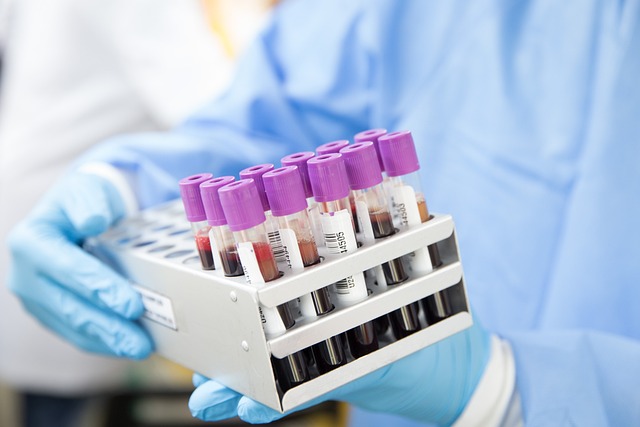Liverpool function tests are pivotal diagnostic tools for medical professionals, offering insights into hepatic health. This article delves into the nuances of these tests, providing a thorough guide for healthcare practitioners. We will explore the utility of home blood testing for liver function in the UK, a method that exemplifies convenience without compromising on reliability. Additionally, we will examine how to interpret test results, elucidating their clinical implications and the role they play in informed decision-making within patient care. Understanding these aspects is crucial for early detection and management of hepatic conditions, ensuring optimal health outcomes for patients.
- Understanding the Standard Liver Function Test: A Comprehensive Guide for Medical Professionals
- Home Blood Testing for Liver Function: A Convenient and Reliable Option in the UK
- Interpreting Liver Function Test Results: Clinical Implications and Decision-Making in Patient Care
Understanding the Standard Liver Function Test: A Comprehensive Guide for Medical Professionals

A Standard Liver Function Test (LFT) is a critical diagnostic tool for medical professionals, providing insights into the health and function of the liver. This test measures several enzymes and proteins in the blood that are produced or regulated by the liver, including alanine aminotransferase (ALT), aspartate aminotransferase (AST), alkaline phosphatase (ALP), gamma-glutamyl transferase (GGT), total bilirubin, albumin, and globulin. For practitioners, understanding the physiological significance of these markers is paramount to diagnosing and monitoring liver disease effectively. Elevated levels can indicate liver damage or inflammation from various causes such as hepatitis, cirrhosis, or drug-induced liver injury. The test’s convenience has also improved with the advent of blood tests at home UK options, which allow for non-invasive sampling in a familiar environment, potentially reducing anxiety and improving patient compliance and comfort. This aspect of LFT administration underscores the importance of accessible healthcare solutions that cater to patients’ needs while maintaining diagnostic accuracy. Medical professionals can utilize these at-home blood tests as part of a broader approach to liver health monitoring, ensuring early detection and intervention for liver conditions.
Home Blood Testing for Liver Function: A Convenient and Reliable Option in the UK

In the United Kingdom, the landscape of medical diagnostics has been transformed by the advent of at-home blood testing for liver function. This innovative approach offers patients a convenient and reliable option to monitor their liver health from the comfort of their own home. The process begins with a simple order of a liver function test kit online, which includes all necessary materials and instructions. Upon receipt, individuals can safely and painlessly collect a blood sample following the provided guidelines, often utilising finger-prick technology. This sample is then securely sent to an accredited laboratory for analysis, where professional medical staff assess liver enzymes and bilirubin levels to determine the health of the liver. The results are subsequently communicated directly to both the patient and their healthcare provider, ensuring a seamless integration into existing medical records. This method not only spares patients the inconvenience of visiting a clinic but also provides immediate access to critical health information, facilitating timely intervention when necessary. Blood test at home UK services are designed to be as user-friendly as possible while maintaining the highest standards of clinical accuracy.
The adoption of home blood testing for liver function in the UK is a testament to the country’s commitment to advancing healthcare delivery through technology. These services are particularly beneficial for individuals with limited mobility, those living in remote areas, or anyone who wishes to avoid public spaces due to health concerns. The convenience of at-home testing does not come at the expense of medical integrity; these tests are performed using the same high-quality equipment and analysed by the same professionals who handle in-clinic tests. Furthermore, they align with the UK’s data protection regulations, ensuring patient confidentiality and security throughout the process. As such, home blood testing for liver function stands as a reliable alternative to traditional clinical visits, offering patients a proactive role in managing their health.
Interpreting Liver Function Test Results: Clinical Implications and Decision-Making in Patient Care

Liver function tests (LFTs) are a cornerstone in assessing hepatic health, providing valuable insights into the liver’s capacity to perform its essential duties. These tests, often including measures of liver enzymes such as alanine aminotransferase (ALT) and aspartate aminotransferase (AST), as well as bilirubin levels and albumin and globulin concentrations, are pivotal in diagnosing and monitoring liver conditions. For medical professionals in the UK, the advent of blood test at home services has facilitated convenient and efficient sampling, ensuring that patients can undergo these tests without the need for clinic visits, thereby enhancing accessibility to healthcare.
Interpreting LFT results requires a nuanced understanding of both the individual values and their clinical context. Elevated levels of transaminases like ALT and AST may suggest hepatocellular injury or damage, while abnormal bilirubin levels can indicate biliary obstruction or hemolysis. Albumin and globulin measurements help evaluate nutritional status and immune function, respectively. The interpretation of these results must be tailored to the patient’s history, symptoms, and other clinical data. For instance, a pattern of liver enzyme elevations can point towards specific etiologies, such as alcoholic liver disease or non-alcoholic fatty liver disease (NAFLD). Medical professionals must integrate these findings with imaging studies, patient history, and physical examination to form a comprehensive picture of the patient’s condition. The availability of blood test at home UK services means that patients can have their results more quickly, allowing for timely decision-making in patient care. This expedited process can lead to earlier interventions, potentially improving health outcomes and patient quality of life.
In conclusion, the standard liver function test is an indispensable diagnostic tool for medical professionals. It plays a pivotal role in assessing hepatic health and detecting potential liver issues early on. The advent of home blood testing for liver function, particularly in the UK, has democratized access to this critical health assessment, ensuring patients can conveniently monitor their liver health from the comfort of their own homes. Interpreting these test results is nuanced and requires a deep understanding of clinical implications, which in turn guides effective decision-making in patient care. The integration of home blood testing into medical practice underscores a significant advancement in healthcare delivery, empowering both clinicians and patients with actionable insights for maintaining liver health. This article has provided a comprehensive guide to understanding, administering, and interpreting liver function tests, highlighting the importance of this non-invasive screening method in the UK’s healthcare landscape.
